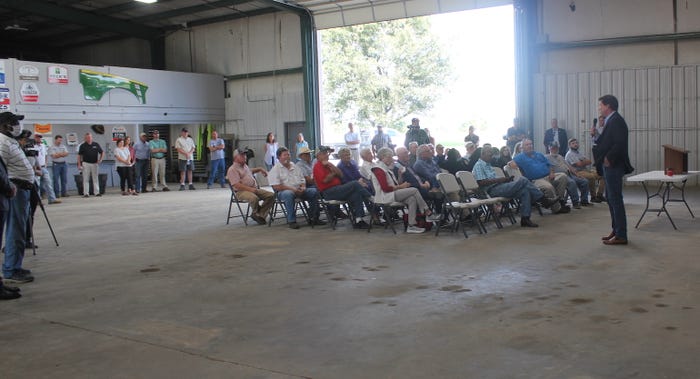
U.S. Senator Bill Hagerty (R-Tenn.) spoke with farmers in his home state recently — addressing concerns about the upcoming Farm Bill, rising inflation, and increased regulation in agriculture.
He also shared his objections to the bipartisan $1 trillion infrastructure bill that cleared the Senate in August and is expected to come before House members for a vote in late September.
Roughly 60 farmers and agribusiness professionals attended the Senator’s stop, which was coordinated by Tennessee Farm Bureau. The event took place in Bolivar, Tenn., at the farm shop of Andy Shelton, local row crop producer.
“We’re very grateful for his visit,” Shelton said. “We’re dealing with a lot of issues right now obviously, and we need all the support we can get from Washington.”
The visit was part of a multi-city economic development tour, which Hagerty says he plans to make into an annual event.
Slowing down infrastructure bill
Hagerty began his speech by explaining his motivation for slowing down Senate passage of the infrastructure bill in August. Hagerty was the only senator who refused to expedite passage of the package. The freshman senator used a procedural maneuver to delay the final vote of the infrastructure bill by five days. It did not change the outcome. The Senate approved the bill by a large margin. But Hagerty called it a “victory for transparency.”
“The American public needs to know what’s in a 2,700-page bill. Which, for reference,” he added, “is twice as many pages as the King James Bible.”

The bipartisan infrastructure bill has been praised by many farm and rural groups, including the National Corn Growers Association and the American Soybean Association. Supporters cite the bill’s funding of priorities important to farmers, such as investments in roads and bridges, ports and inland waterways and rural broadband.
“I support hard infrastructure,” Hagerty told the audience, “but infrastructure has got to be paid for. It has to yield a real return on investment. They advertised that this would be paid for, and it’s not — by a long shot.”
Hagerty said the bill will increase the federal deficit by more than $250 billion over the next decade.
“It’s getting harder in Washington right now,” Hagerty told the audience. “We’re seeing a wave of socialism coming our way. It’s being offered by a guy named Bernie Sanders, it’s got a $3.5 trillion price tag, and it pushes more government dependency on us from cradle to grave.”
Hagerty was referencing the second piece of infrastructure legislation proposed by Democrats. The $3.5 trillion proposal is often referred to as an investment in human infrastructure. While the gigantic social spending plan is still being finalized, some House progressives have said they will not support the $1 trillion bipartisan infrastructure plan unless the Senate moves quickly on the second bill.
“What it would mean from a tax standpoint would be destructive to our economy like never before,” Hagerty said.
Inflation and Farm Bill
During his stops, Hagerty heard from many farmers concerned about inflation driving up costs as well as supply chain issues.
“There is a lot more inflation in the system, and it is not transitory. Yes, there are some supply chain dislocations, but inflation from May to June delivered a 12% increase. We have a huge problem with inflation.”
Farmers at the meeting expressed their concerns about economic pressure and growing regulation. With discussions about the next Farm Bill likely starting soon, farmers in the audience also expressed concerns about that legislation.
“The Farm Bill has a lot of complications and hopefully a lot of opportunities where we can make changes,” Hagerty said. “We’ve got federal regulations like WOTUS that need to be changed in a way that makes it possible for farmers to do their job, not impossible.”
About the Author(s)
You May Also Like






